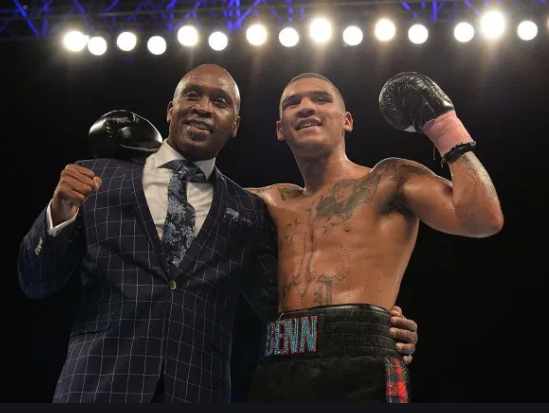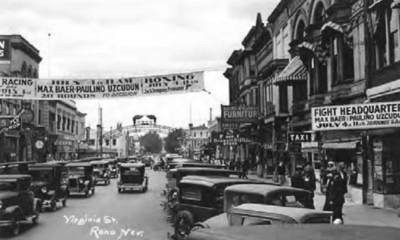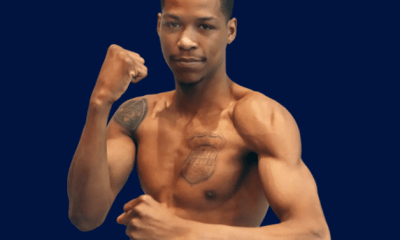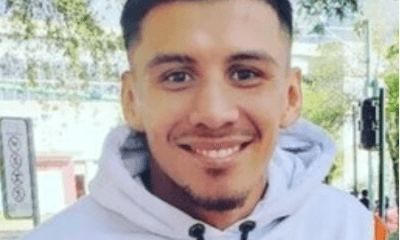Featured Articles
Nigel Benn’s Ill-Advised Comeback is Yet Another Bad Look for Boxing

On November 23 in Birmingham, England, 55-year-old Nigel Benn (42-5-1, 35 KOs), will face 40-year-old Sakio Bika (34-7-3, 22 KOs), the former WBC super-middleweight champion from Australia by way of Cameroon. Nigel (pictured with his son Conor Benn, a 15-0 welterweight) is in good shape both physically and mentally and is a Born Again, but none of that matters when fighting a much younger roughhousing guy like Bika. This fight, licensed by the British and Irish Boxing Authority (BIBA), should never have been sanctioned.
Ill-advised comebacks are just that, ill advised. Sugar Ray Leonard, Alexis Arguello, “Little Red” Lopez, Razor Ruddock, Fitz Vanderpool, Ricky Hatton, David Tua, Gerry Cooney, Bert Cooper, Greg Page, Corrie Sanders, Ali, and Earnie Shavers found this out the hard way. But suddenly ill-advised comebacks seem to be metastasizing.
“At 35, I was good as ever; same with 45. But after 49-55, no injuries healed. Slaps on the head Caused confusion. So I said no more boxing……” -George Foreman
“A fighter never knows when it’s the last bell. He doesn’t want to face that.”-Sugar Ray Leonard
The Rain Man
Ray Austin, 48, is still fighting and still losing. After a promising start way back in 1996, he came a cropper against Wlad Klitschko in 2007 and it has been all downhill after that. He has lost six of his last seven albeit against stiff opposition. It’s time for Ray to get out of the rain.
The Atomic Bull
Oliver McCall unwisely decided to get back in the ring at the ripe old age of 53 and has shockingly won two bouts—one in 2018 against Larry Knight (3-20-1) and one this past June against Hugo Lomeli (21-14-1). While his record is 59-14, given his past issues outside of the ring, McCall, now 54, should not be anywhere near a boxing match. There are some who see him as unstable and in possible need of an interdiction.
McCall says, “I know I will stop Tyson [Fury] with body shots which will make his liver quiver and his whole body shiver…The major motivation for me is that I just love the sport of boxing…I want to make history.”
The Southern Disaster
Dominick Guinn, like McCall, has an iron jaw and remains very active but he now loses more than he wins. He also fights just about everywhere in the world. At 44, however, he is flirting with his own “disaster” and he needs to reconsider this line of work, especially given the very high level of his opposition.
Tank
Sherman Williams (42-15-2), another road warrior, has won five straight against fair to middling opposition. He too has the granite chin that seems to be at least part of the reason why these elders last so long (Saoul Mamby being a prime example of this). But that can have a nasty flip side. At any rate, if The Tank quits now, he could nicely bookend his career.
Brixton Bomber
Danny Williams once knocked out Mike Tyson. Now the 46-year-old is fighting wherever he can get a license and going up against men like Martin Stansky (3-42) for something called the Global Boxing Federation World Heavyweight Title. He also beat 42-year-old Pavel Siska who has lost 33 in a row, the great majority by stoppage. When Danny beat Iron Mike, his record was 31-3; now it’s 53-28. The once rock-solid fighter from the UK is now an accident waiting to happen.
The Man
Anthony Mundine is 44; he is scheduled to fight 43-year-old John Wayne Parr in November. All well and good, but Parr’s last fight was against Sakio Bika in 2003. This one has a side-show attraction.
The King
Likable good-guy Sam Soliman is 45 and still fighting. He beat Mark Lucas in April 2019 for a fringe middleweight title, but he needs to get out. He’s too nice of a bloke to stay in the game and risk a humiliation; that is, unless he can find someone even older to fight.
The White Wolf
Meanwhile, shopworn 43-year-old Siarhei Liakhovich is howling like a wolf and saying he wants to come back. “I am very serious about my comeback,” he said. “I’m looking forward to get what I got before: A title.” This comes six years after being KO’d by Deontay Wilder, a knockout that resembled someone being tasered as the White Wolf’s body twitched disturbingly. (Liakhovich defeated Dominick Guinn in 2004. Perhaps they can rematch and then both retire.)
Alexander The Great
Russia’s Alexander Ustinov, closing in on 43, appears useful as a gatekeeper for up and coming heavyweights, as had been true of Maurice Harris, 43, who hasn’t fought since July of last year and may have finally retired. Harris was stopped in the opening round in each of his last three fights and hopefully has seen the light.
The Real Deal
Even 56-year-old Evander Holyfield, emboldened by some sparring, plans returning to the ring next year for a charity event in Japan. The details are still developing.
While boxing is not going anywhere soon, it doesn’t need side show attractions or money grabbing exhibitions in Japan.
There are many others who need to get out and/or not come back.
The Vacillating Nature of Boxing Fans.
Fans are becoming hyper-fickle of late, or so it seems, and this has added to the current cynicism. For example:
GGG in tough and “drama”tic fight –now he’s a loser.
Fury gets sliced up –now he’s a loser.
Spence wins close one –now he’s a loser
Joshua is upset –now he’s a loser
The Shields Affair
Finally, the Claressa Shields vs. Ivana Habazin WBO and WBC 154-pound world title fight was cancelled following a bloody altercation prior to the official weigh-in that resulted in an injury to Habazin’s trainer James Ali Bashir (not to be confused with former boxer Bash Ali), a troubling incident that continues to play out in the news.
Recently, there have been a number of things that have come off that have hurt the image of boxing; the assault of James Ali Bashir was merely the latest. Boxing goes through these stages from time to time and maybe it’s an inherent part of the business, but when incidents and proposed events play with the health of the participants, the tolerance threshold needs to come down. Let’s hope things start to move in a more positive direction.
Ted Sares is a lifetime member of Ring 10, a member of Ring 8, and a member of Ring 4 and its Boxing Hall of Fame. He also is an Auxiliary Member of the Boxing Writers Association of America (BWAA). In 2019, he received Ring 10’s Harold Lederman Award for Historian. He still competes as a power lifter in the Master Class.
Check out more boxing news on video at The Boxing Channel
To comment on this story in The Fight Forum CLICK HERE
-

 Featured Articles3 weeks ago
Featured Articles3 weeks agoAvila Perspective, Chap. 330: Matchroom in New York plus the Latest on Canelo-Crawford
-

 Featured Articles2 weeks ago
Featured Articles2 weeks agoVito Mielnicki Jr Whitewashes Kamil Gardzielik Before the Home Folks in Newark
-

 Featured Articles4 weeks ago
Featured Articles4 weeks agoOpetaia and Nakatani Crush Overmatched Foes, Capping Off a Wild Boxing Weekend
-

 Featured Articles3 weeks ago
Featured Articles3 weeks agoCatching Up with Clay Moyle Who Talks About His Massive Collection of Boxing Books
-

 Featured Articles4 weeks ago
Featured Articles4 weeks agoFabio Wardley Comes from Behind to KO Justis Huni
-

 Featured Articles2 weeks ago
Featured Articles2 weeks agoMore Medals for Hawaii’s Patricio Family at the USA Boxing Summer Festival
-

 Featured Articles3 weeks ago
Featured Articles3 weeks agoThe Shafting of Blair “The Flair” Cobbs, a Familiar Thread in the Cruelest Sport
-

 Featured Articles3 weeks ago
Featured Articles3 weeks agoRichardson Hitchins Batters and Stops George Kambosos at Madison Square Garden






















